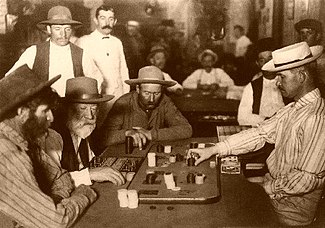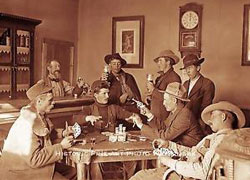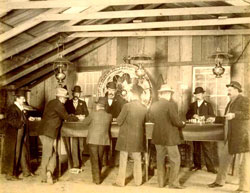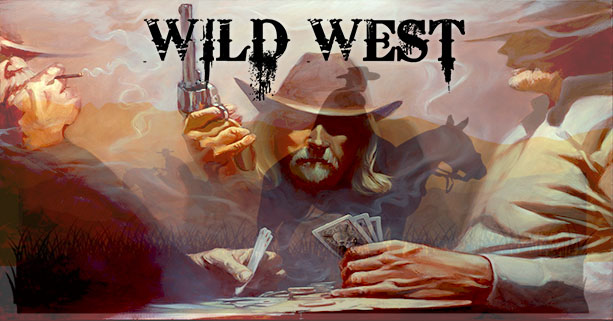Clint Eastwood once claimed that the United States was only responsible for 2 unique art forms:
- Jazz
- The Western
Of course, movie westerns wouldn’t be complete without gambling. Poker is a recurring theme in many of them. Casino gambling was common during the Wild West, too, and you’ll see plenty of that in western movies and TV shows, too. The gambling in Deadwood on HBO was a major plot point.
In the real Old West, you’re looking at a frontier culture. Small, often lawless, towns sprung up in the places you’d expect:
- Near gold mines
- Near military outposts
- Near river crossings
The kinds of people hanging out in such locations are the kind of people who like to take risks. They were the kind of people who liked to drink and gamble. The kinds of businesses that popped up in such location were what you’d expect: bars, bordellos, and casinos. Some of these businesses occupied little more than tents in the mud. A bar might not be much more than a couple of board stretched out across a couple of barrels.
Other than on Deadwood, many movies set during the Wild West make these businesses look bigger and fancier than they were. But make no mistakes, camps became towns, and towns became cities. And in those cities, these businesses grew big and fancy. And the gambling houses were often the biggest and fanciest of these businesses.
The period we think of as “the Old West” or “the Wild West” was actually a relatively short period in our nation’s history. It began when the Civil War ended in 1865, and the period is generally agreed to have ended around 1890, making it just a 25 year segment of time. But what was it actually like to gamble in these places? What was it like to gamble in the Old West? That’s what this post is about.
Faro: The Most Popular Gambling Game in the Old West

When it comes to popular gambling games in the Old West, faro was #1 with a bullet. The game derives its name from the pictures of pharaohs on the backs of the playing cards used for the game.If you played faro in the Old West, chances weren’t bad that you’d run into an Italian immigrant named Charles Cora, the most successful faro player in the Old West. He won over $85,000 during a 6-month period and broke several casinos. Like today’s card counters, Cora was banned from many casinos.
In faro, one player is the dealer (or “banker”). The other players are “punters.” Since the gamblers in the establishment usually dealt, there were a lot of cheaters in faro. Punters tried to get several cards of one suit that they could lay down on the table in order. You could bet on how many cards you could get. The dealer drew 2 cards. One card was the losing card, and the other was the player’s card. The player’s card was the card determining the winner, and suits didn’t count for this purpose.
If you left bets on a card number that didn’t get drawn, the bet stayed in action. If you placed a bet on a card that matched the dealer’s card, you lost that bet. Bets paid even money. The game was fast and easy, and Old West gamblers loved it. No one plays faro any more, as far as I know.
Poker in the Wild West

One of the most popular card games in the Wild West was poker. Compared with today’s versions of the game, poker in the Old West was much simpler. But it was still a card game with bluffing elements where you played against the other players.Draw and stud were the 2 most common poker variations played during the Wild West period. The decks of cards were smaller, too—they just had 20 cards in the 4 traditional suits.
The cards were:
- Ace
- King
- Queen
- Jack
- 10
Naturally, you had different hand rankings to deal with in the Old West, too. They also had different names. A full, for example, was like today’s full house. Triplets is what they called a 3 of a kind. And of course, since these are the only cards in the deck, the only kind of straight flush you could get would be a royal flush.
Draw poker was called “jackpots.” It was basically the same game we now know as 5-card draw with jacks or better to open. Even if you don’t know much about the Old West, you’ve probably heard of the famous “dead man’s hand.” Wild Bill Hickock was playing jackpots when he was dealt this hand.
Blackjack in the Wild West
Blackjack was introduced to the Old West via the French community in New Orleans. They called it “vingt-et-un,” which is French for “one-and-twenty.” Some people still call blackjack “21.” As with poker, blackjack was played slightly differently than it is today, although it’s still recognizably the same game.

The goal of vingt-et-un was to get as close as you could to 21 without going over, just like in today’s game. One of the big differences between blackjack and vingt-et-un is that the latter gave every player the opportunity to play as the dealer. Modern casinos only offer the game in a house-banked version.
Also, unlike modern blackjack, you get a card face down before making your bet in vingt-et-un. The dealer also has the opportunity to double the bet sizes. Modern blackjack as played at home often mirrors this, too. You get to take over as the dealer if you and the dealer tie with a “natural” (a 2-card hand totaling 21.) Dealers win triple money from the players if he gets a natural, while players get 2 to 1 if they have a natural.
Mexican Monte
Mexican monte was the national card game of Mexico and was played with a 40-card deck. It was brought to the United States by soldiers who had fought in the Mexican-American War of 1848. The dealer pays off when you get matching cards. This should not be confused with 3-card monte, which is more of a swindle or a hustle than a casino game.
Mexican monte is played with 2 cards from a deck of 40 cards. This is roughly analogous to a modern deck of cards, but the 8s, 9s, and 10s are removed. The players play against the dealer, making this a house-banked game like blackjack. The dealer starts the game by drawing a card from the bottom of the deck and putting it face-up on the table. This is the “bottom layout.” He also draws a card from the top of the deck and places it face-up on the table. Give yourself bonus points if you figure out that this is the “top layout.”
The dealer puts the rest of the cards (“the monte”) face-down in front of him. The players then get to bet on either or both layouts. Betting starts on the dealer’s right and proceeds counter-clockwise. Then the dealer turns the top card of the monte over. This becomes “the gate.”
If you have a bet on a matching suit, you get paid off. But if the gate doesn’t match the suit in the layout, the banker wins all the bets on the layout. John Wesley Hardin, who was famous for killing a man for snoring, is also famous for killing a man over a game of Mexican monte.
Roulette during the Old West

Roulette in the Old West was played more or less the way we play today. The wheel had 38 numbers on it, and this included a green 0 and a green 00. Half of the rest of the numbers were black, while half were red. The house edge was still 5.26%.Roulette’s one of the oldest gambling games in the world, and it hasn’t changed much over time.
Sports Betting in the Old West
You didn’t bet on football or baseball games during the Old West, but gamblers would bet on almost anything. Some of the most common events to bet on included animal fights, boxing matches, and races.
Animal fights are illegal in most civilized countries now, including the United States, but all kinds of animals were forced to fight in the Old West. Cockfights were common. So were dog and bear fights.Boxing matches were basically street rights. They didn’t use gloves, either. Most of the moves used in a boxing match during the Old West would be against the rules in a modern boxing match, for sure.
Gamblers in the Old West would also bet on any kind of race you could imagine. This might be the gamblers themselves, animals, or even bugs—you know, like in prison movies.
The Dice Game Hazard
The Old West was before craps, but one of craps’ antecedents was played—hazard. Believe it or not, it’s played with 2 dice, but hazard is even more complicated than craps.
The person rolling the dice during hazard is called “the caster.” Before he throws the dice, he has to announce a number between 5 and 9. That number is “the main.”
Any other roll is called “a chance.” The caster gets to keep rolling. If they roll a main after this, they throw out. If they roll the chance, they throw in. (The chance is comparable to a point in craps today.) Otherwise they keep rolling.
You got to continue as the caster until you throw out 3 times in a row. Then the next person to the caster’s left gets to throw the dice.
Famous Casinos of the Old West
Robert A. Parker built the Parker House, one of the most famous old West casinos, as a hotel in San Francisco. Being a smart man, Parker realized that the gambling fever spreading throughout the city was where the real money was to be made.
The Parker House hosted 3 faro tables, 2 monte tables, a roulette table, and a final table that was used for whatever seemed convenient that evening. A professional gambler could pay $10,000 to the house to be allowed to conduct games in the Parker House.
There was also a smaller room behind the bar that professional gamblers could rent for $3500 a month. At one time, a gambler named Jack Gamble rented the 2nd floor for $60,000 and put casino games in all the rooms. On any particular day, $500,000 might be found on the tables of the casino.
That wasn’t the only big casino in San Francisco, either. On either side of The Parker House you could find 2 additional casinos:
- El Dorago Gambling Saloon
- Samuel Dennison’s Exchange
Both properties were owned by entrepreneurs James McCabe and Thomas J.A. Chambers, who were partners. And those are just the names of the largest casinos there. Smaller casinos in San Francisco at the time included such colorfully named establishments as:
- Aguila de Oro
- The Arcade
- The Alhambra
- Bella Union
- The Empire
- The Fontine House
- The Mazourka
- The Rendezvous
- La Souciedad
- The St. Charles
- The Varsouvienne
- The Ward House
Obviously, many of these establishments were owned and operated by French immigrants. Gambling in an Old West casino was different in another respect from gambling at a modern casino. Shooting and stabbings were common there and then. (You’ll rarely hear about that sort of behavior in modern casinos with heavy security.)
I already mentioned Charles Cora, but his faro career came to an end when he shot U.S. Marshal William H. Richardson in 1955 on the street in San Francisco. Most deaths during the period weren’t caused by law enforcement, either. Things had just gotten bad enough, crime-wise, by that point, that the cityfolk had started forming Vigilance Committees again to deal with the violent crime. Cora was hanged for shooting the marshal, even though if he’d committed the murder a few months earlier, he probably would have been exonerated for reasons of self defense.
Gambling was crazy popular in the Wild West. The games were different, and the players were often paying the house to run the games themselves. Eventually, the Old West died a quick death, but for a while, the frontier was the home to all kinds of rough and rowdy sinning. Gambling was just part of it.
Some of that atmosphere lives on, especially in some of the more traditional casinos in Nevada. But one thing’s for sure—they didn’t have slot machines in Old West gambling halls.

 MENU
MENU











